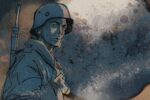Have you ever read a book that doesn’t seem like it wants to be read? A work that is complex to the point of confusion, direct to the point of near-hostility, and self-referential to the point of being almost self-serving? It’s a rare thing to be in the mood for particularly challenging literature. It’s preferable to engage with a challenging film: a spectacle rife with motion and energy to catch the eye and hold down the mind to prevent it from skipping down a page or rereading the same sentence over and over. Yet sometimes a challenge must be answered; your pride as a reader is on the line, after all. Italo Calvino’s metafictional novel “If on a Winter’s Night a Traveler” presents such a challenge by daring to ask a simple, mindboggling question: What is reading?
Italo Calvino (1923 – 1985) is possibly one of the most beloved Italian writers of all time. He’s certainly high on the list of the most translated contemporary authors, respected as he is throughout the West. Calvino led a diverse life of writing and storytelling, he was a novelist, an essayist, a journalist and a folklorist. He is most well-known for his fascinating style and mastery of his chosen genre, although both clearly evolved throughout his life. His youth was defined by wartime; he was born to a father who survived the Mexican Revolution and he served in the Italian Resistance during World War II. While these political influences originally presented themselves as part of his explorations of human motive and psychological realism, his body of work soon shifted in a more whimsical and postmodern direction.
Calvino’s work is a brilliant example of postmodern literature, and exhibits a highly experimental flavor. This characteristic is visible in his equally notable novel “Invisible Cities,” which presents Marco Polo’s descriptions of various fictional metropoles. These short chapters can be read in any order, so long as the reader can find thematic significance in their chosen order. It’s an inventive project that weaves together a beautiful web of folklore and oral tradition and is clearly influenced by his love of the relational aspect of storytelling. This theme is more thoroughly investigated in “If on a Winter’s Night a Traveler”, which cranks the experimentation up a notch by introducing second-person narration and the concept of metafiction.
Metafiction is straightforward in definition but less so in execution. It is, in essence, where the author tries to frame the narrative in such a way as to draw attention to the fact that you are reading; it is reading about reading. It is somewhat anti-immersion; it exists to draw attention to the obvious and break you out of the imagined reality most reading offers. The text in question has something worth saying, and yet foregoes the easiest opportunity to say it. It, therefore, must seek another way to engage its audience. A metafictional novel needs a hook, and Calvino’s novel has a few things going for it that catch the reader’s attention.
First, the premise. “If on a Winter’s Night a Traveler” is a book that contains ten books within it, including itself. Immediately embracing its metafictional elements, this novel follows the main character, the Reader, in his journey to finish a book. This goal repeatedly eludes him through continuous interruptions, misprints, theft and global conspiracies. It’s the painful cycle of beginning to tell a story and never finishing it. Each consequent story is beautifully executed and distinct from the one that precedes it. Its content can range from murder to philosophy, espionage to romance (disclaimer: adult content with excruciating detail). You are left wishing that each could be their own real-life book; you begin to identify with the protagonist, exactly as Calvino intended.
Second, the style. The novel’s chapters are split in two, the first halves covering Calvino’s actual story, which just so happens to be written in the second person narrative, and the next halves being the previously mentioned books-within-the-book that will never be completed. You, the Reader (but sometimes the Other Reader), are the focus of the narrative, the person who is experiencing all that Calvino says you are. You are able to take on the mantle of the protagonist; you are just someone trying to finish a book. The chosen POV forces you to have the same thoughts, make the same observations, and ask the same questions.
And the central question remains: “What is reading?” Calvino’s life was marked by a love of folklore and oral tradition. The inherent communal nature of storytelling highlights relationality as core to the entire process. Some might believe reading to be a solitary affair, wherein the Reader may never truly relate to the Other Reader, for both are entrapped within individual interpretations of the text they have consumed. Calvino considers that idea, and it may very well be correct as far as one is talking about interpreting a book. However, his exploration of reading as interpretation extends far beyond the physical confines of ink and paper.
“If on a Winter’s Night a Traveler” draws a beautiful comparison between relationships and reading. Just as reading a book is attempting to understand it, we can “read” each other in an attempt to understand each other. The plot is convoluted; people are convoluted. There are layers to be unwound and untangled, deceptions and misdirection and miscommunications to confront and challenge and stumble over. Reading is placing trust in the hands of the author as you head out into the unknown, just as one might place their trust in another as they learn more about each other and themselves. Put Calvino on your reading list and see what he reveals to you.

















